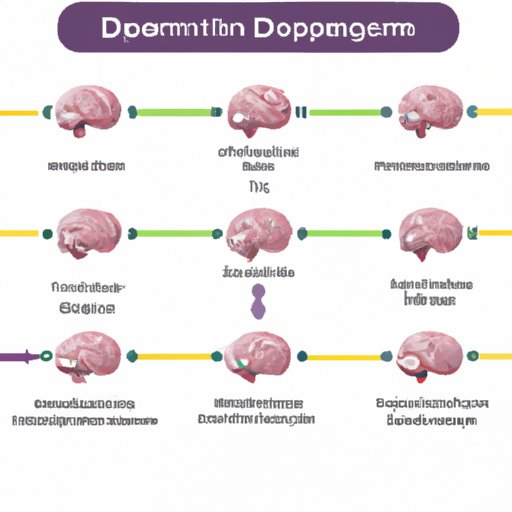Introduction
Dopamine is a neurotransmitter that plays an important role in many areas of the brain. It is responsible for regulating our emotions, motivation, learning, memory, and behavior. In this article, we will explore how dopamine works in the brain, from its role as a neurotransmitter to its effects on behavior and cognition. We will also examine different types of dopamine receptors, how drugs alter dopamine levels, and the relationship between dopamine dysregulation and mental health disorders.

Explaining the Role of Dopamine in the Brain
The brain’s neurotransmitter system is what allows us to communicate with one another. Neurotransmitters are chemical messengers that carry signals across the brain. Dopamine is one of these neurotransmitters, and it plays an important role in regulating our mood, behavior, and cognitive processes.
Dopamine is released into the synapse between two neurons, where it binds to specific receptors on the postsynaptic neuron. This binding causes the postsynaptic neuron to become more or less likely to fire an action potential (i.e., a signal), depending on the type of receptor activated. In this way, dopamine helps to modulate communication between neurons in the brain.
In addition to its role as a neurotransmitter, dopamine also acts as a neuromodulator. Neuromodulators can influence the activity of many neurons at once, rather than just two neurons like neurotransmitters do. Dopamine helps to regulate a wide range of functions in the brain, including motor control, reward-motivated behavior, and cognitive processes such as attention and working memory.
What Causes Dopamine Levels to Increase or Decrease?
Dopamine levels in the brain can be affected by both natural processes and drugs. Natural processes that affect dopamine levels include stress, exercise, sleep, and diet. Stress, for example, can cause dopamine levels to increase, while exercise can cause them to decrease. Sleep and diet can also have an effect on dopamine levels, although the exact mechanisms are not yet fully understood.
In addition to natural processes, illicit and prescription drugs can also affect dopamine levels. Stimulants such as cocaine and amphetamines increase dopamine levels, while depressants such as alcohol and opioids decrease them. Prescription drugs such as antipsychotics and antidepressants can also affect dopamine levels, although the exact mechanism of action varies depending on the drug.
How Does Dopamine Affect Behavior and Cognition?
The effects of dopamine on behavior and cognition depend largely on the level of dopamine in the brain. Low levels of dopamine are associated with reduced motivation and decreased reward-seeking behavior, while high levels of dopamine are associated with increased energy, alertness, and pleasure-seeking behavior.
Low dopamine levels have also been linked to cognitive deficits such as impaired executive functioning, working memory, and attention. High dopamine levels, on the other hand, have been linked to improved performance on tasks requiring sustained attention, as well as increased risk-taking behavior.

Different Types of Dopamine Receptors and Their Functions
There are several different types of dopamine receptors in the brain, each of which has a different function. The most common types are D1, D2, and D3 receptors. D1 receptors are mainly located in the prefrontal cortex, where they are involved in executive functioning and working memory. D2 receptors are located in the striatum, where they are involved in reward-seeking behavior. Finally, D3 receptors are mainly located in the limbic system, where they are involved in emotional regulation.
In addition to these three main types of dopamine receptors, there are also D4 and D5 receptors, which are involved in various aspects of cognitive processing and emotion regulation.
How Drugs Alter Dopamine Levels
As mentioned earlier, certain drugs can alter dopamine levels in the brain. Stimulants such as cocaine and amphetamines increase dopamine levels, while depressants such as alcohol and opioids decrease them. Antipsychotics and antidepressants can also affect dopamine levels, although the exact mechanism of action varies depending on the drug.
When taken in large doses, drugs that increase dopamine levels can lead to a dangerous condition known as dopamine dysregulation syndrome. This condition is characterized by compulsive drug use, severe cravings, and changes in behavior and cognition.
The Relationship Between Dopamine Dysregulation and Mental Health Disorders
Dopamine dysregulation has been linked to several mental health disorders, including schizophrenia, bipolar disorder, and attention deficit hyperactivity disorder (ADHD). A recent study found that people with schizophrenia had higher levels of dopamine in the prefrontal cortex compared to healthy individuals, suggesting that dopamine dysregulation may be involved in the development of schizophrenia.
Treatments for mental health disorders linked to dopamine dysregulation typically involve medications that either increase or decrease dopamine levels in the brain. These medications can help to reduce symptoms and improve functioning.

Potential Benefits of Increasing Dopamine Levels
Increasing dopamine levels in the brain can have some potential benefits. For example, increased dopamine levels can improve focus and concentration, reduce anxiety, and boost motivation. However, it is important to note that increasing dopamine levels too much can have negative side effects, such as restlessness, agitation, and insomnia.
Conclusion
In conclusion, this article has explored how dopamine works in the brain, from its role as a neurotransmitter to its effects on behavior and cognition. We have also examined different types of dopamine receptors, how drugs alter dopamine levels, and the relationship between dopamine dysregulation and mental health disorders. Finally, we have discussed the potential benefits and risks of increasing dopamine levels.
It is clear that dopamine plays an important role in many areas of the brain, and understanding how it works can help us better understand and treat mental health disorders linked to dopamine dysregulation.
(Note: Is this article not meeting your expectations? Do you have knowledge or insights to share? Unlock new opportunities and expand your reach by joining our authors team. Click Registration to join us and share your expertise with our readers.)
